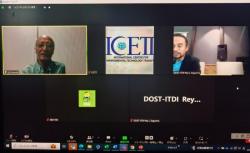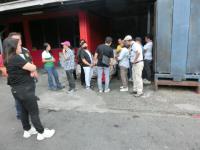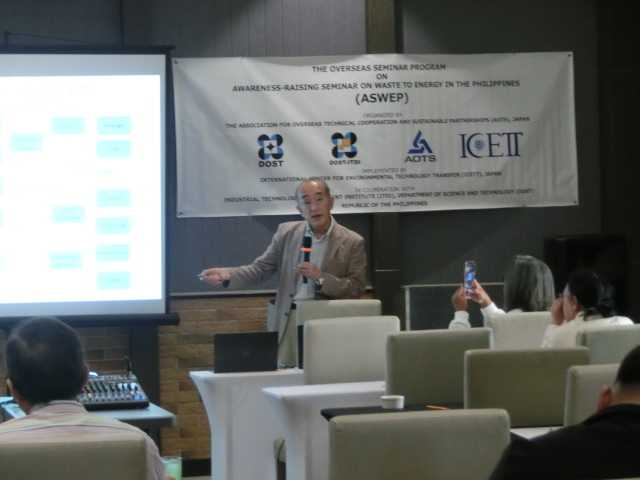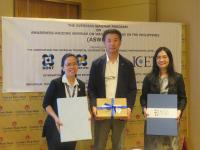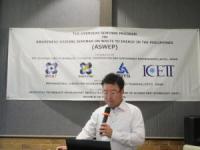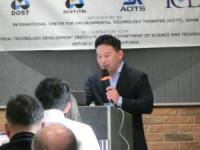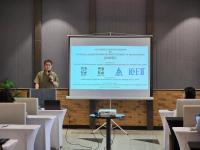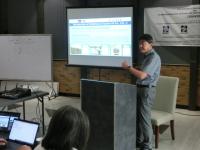Report】Human Resources Development Project in the Field of Advanced Technology Deployment (Green Strategy) Seminar in the Philippines
Summary
The "Seminar on Energy Recovery from Waste" was held three times in July and November 2023 and February 2024 in the Clark Special Economic Zone, Pampanga Province, Philippines, with a Japanese government grant from the Association for Overseas Training of Human Resources for Industry (AOTS). The training was conducted with the help of a Japanese government subsidy from the Association for Overseas Industrial Talent Development (AOTS). A total of 84 people participated in the training.
The content of the program centered on lectures on resource recycling and LCA by academic experts and introductions by Japanese company executives to technologies related to refuse derived plastic & paper densified fuel (RPF) and heat recovery boilers that utilize RPF. In addition, the program also included observation tours of local companies' initiatives and discussions among local stakeholders on needs and the direction of their initiatives.
We plan to link these to future efforts.
background
In April 2021, the Philippines formulated the "Long-Term Climate Change Strategy and Nationally Determined Contribution (NDC)," which aims to reduce greenhouse gas emissions by 751 TP3T by 2020-2030 by promoting clean energy measures that utilize renewable energy and alternative fuels. The goal is to reduce greenhouse gas emissions by 751 TP3T by 2020-2030 through the promotion of clean energy measures using renewable energy and alternative fuels.
On the other hand, the Clark area, a special economic zone, is in need of urgent measures to deal with serious environmental problems such as rising energy prices, especially the soaring price of coal and increasing waste emissions, due to population growth and increased industrial activity. These circumstances have led to the implementation of this seminar project in response to requests from past ICETT trainees.
Purpose
In order to promote efficiency in the use of energy and reduction of CO2 emissions in the industrial sector in the Philippines, a seminar was held to introduce the RPF technology and heat recovery boiler technology owned by Japanese SMEs as part of the WTE (Waste to Energy) technology that converts waste into energy, with the aim of improving the local human resource development and strengthening bilateral cooperation for social implementation in the region. The seminar raised awareness of the fact that waste plastic can be used as a resource and that heat can be recovered even with a small boiler.
Parties and Subjects Involved
With the support and cooperation of the Ministry of Economy, Trade and Industry (METI), AOTS, JETRO Manila Office, JETRO Mie Office, etc., and with the Department of Science and Technology of the Philippines (DOST) as a counterpart, the seminar was held with government officials, engineers from organizations and companies, and academics from the Clark area in the Third District of Pampanga. The seminar was held with the support and cooperation of the JETRO Triplex Office and other organizations.
First Seminar July 20-26, 2023 19 participants
Carbon neutrality, life cycle assessment (LCA), resource recycling, examples of local production for local consumption in waste power generation in Japan, and environmental activities for local communities were introduced to foster understanding of resource recycling policies and technologies.
Second Seminar November 6-9, 2023 45 participants
The importance of LCA for companies and the characteristics, significance, mechanism, and challenges of RPF, which is one of the fuels that can replace coal and is mainly made from waste plastics, were introduced. He also explained the effectiveness, mechanism, advantages, and challenges of using waste plastic and biomass boilers.
3rd Seminar February 7, 2024 20 participants
We shared information with the participants on the results and issues before and after the seminar in order to help Japanese companies advance into the market and create opportunities for them, as well as to develop human resources for corporate engineers.
Photo
